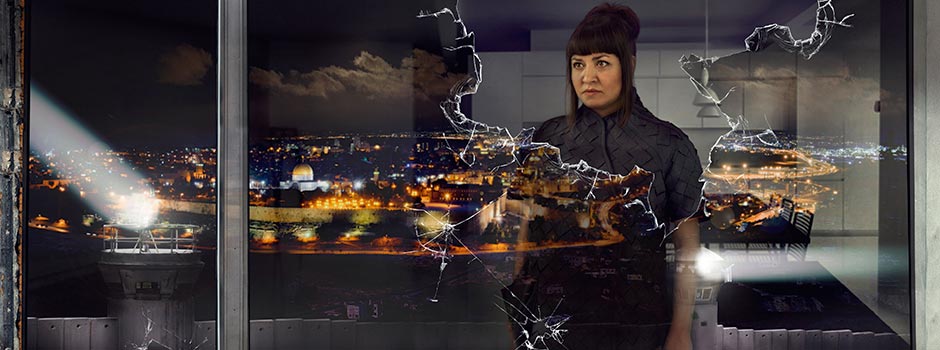
AN INTERVIEW WITH PALESTINIAN ARTIST LARISSA SANSOUR Between Utopia and Dystopia
Sep 09, 2013 Interview

Larissa Sansour was born in Jerusalem, Sansour studied Fine Art in Copenhagen, London and New York. Her work is interdisciplinary, immersed in the current political dialogue, combining video art, photography and experimental documentary. Sansour's work features in galleries, museums, film festivals and art publications worldwide. She lives and works in London and Copenhagen.
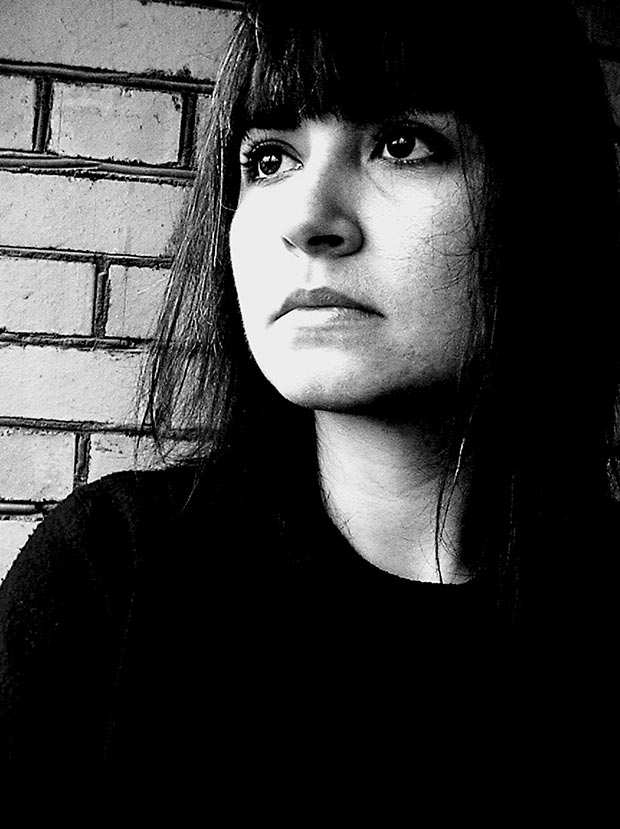 Larissa Sansour / Courtesy of the Artist
Larissa Sansour / Courtesy of the Artist
The fact that I grew up in Palestine has had a major influence on my work. The Palestinian question is always on the brink of reaching a saturation point, and it is therefore vital to keep on finding news ways to address the issue. As an artist, I am no longer focused on relating factual information or shedding light on the details of the Israeli occupation, but I am more interested in inviting the international public and audiences to engage in a dialogue about the Palestinian situation on equal terms.
Yes, certainly. Being part of different scenes makes you aware of the various dialogues that are taking place, differences as well as similarities. By now I have been living abroad for more than 25 years, and having to adjust over and over again to new ways of perceiving the same problem has been a very valuable experience. I suppose that is part of the reason why I am very interested in spinning a different narrative for Palestine, not only for people outside of Palestine but also for within Palestine.
If any one property can be said to be inherent to art practice it would be its subversive nature. Art has always positioned itself in dialogue with its own past and present, constantly adding, revising and subverting its own context in attempts to redefine itself. Today artists worldwide tend to be very socially and politically engaged, and my work specifically relates to Palestine because I happen to come from a politically flammable place. I also do believe that art has an ability to affect political change. And the number of censored exhibitions and artists in prison seems to support that idea.
Something that fascinates me is the blurred distinction between utopia and dystopia, and this is at play in my latest work, 'Nation Estate'. The piece envisions the Palestinian state confined to a single skyscraper. But also a work like 'A Space Exodus', where you see me as the first Palestinian astronaut landing on the moon and planting a Palestinian flag, delves into this topic.
A certain notion of impotence permeates these works, but I think it is not an impotence in relation to the state of Palestinian affairs, but of a much more universal inability to come to come to terms with humanity's own advancement and progress when it comes to human rights or technology.
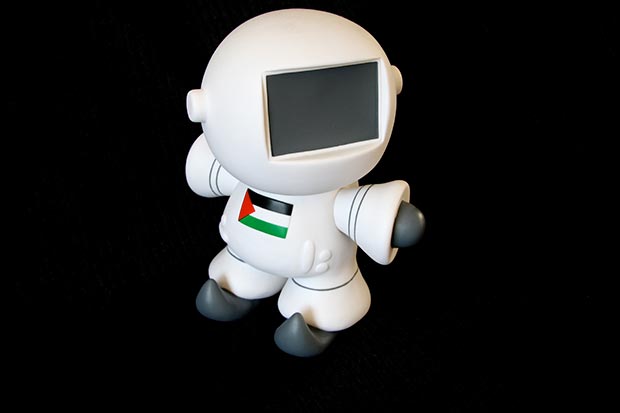 Larissa Sansour / 'A Space Exodus' - Palestinaut / Courtesy of Lawrie Shabibi and the Artist
Larissa Sansour / 'A Space Exodus' - Palestinaut / Courtesy of Lawrie Shabibi and the Artist
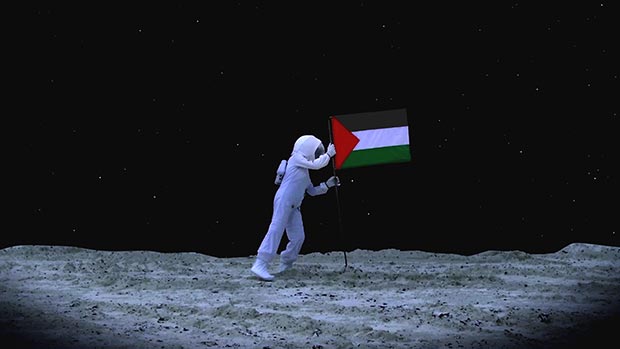 Larissa Sansour / 'A Space Exodus' - Flag, 2009, 45x80cm / Courtesy of Lawrie Shabibi and the Artist
Larissa Sansour / 'A Space Exodus' - Flag, 2009, 45x80cm / Courtesy of Lawrie Shabibi and the Artist
'Nation Estate' is directly inspired by the events of recent years, specifically the Palestinian bid for full membership at the UN. With Israeli settlement activity confiscating more and more Palestinian land, it struck me that for a Palestinian state ever to materialize, one would have to think vertically.
In 'Nation Estate', Palestinians finally have their state in the shape of a single skyscraper housing the entire population. Each city has its own floor complete with replica landmarks, the Dome of the Rock in the lobby on the Jerusalem floor, the Nativity Church on the Bethlehem floor, and so on.
By resorting to science fiction, 'Nation Estate' continues a path laid out a couple of years ago when I started taking an interest in not only sci-fi, but also the concept of the superhero. As futuristic mirror images of current ideas and ambitions, both forms are interesting conceptual playgrounds.
In the case of Palestine, the ambitious ideas that we hope to achieve, like statehood and independence, have long since become so repetitive that the odd mix of nostalgia and accomplishment that the sci-fi genre often embodies lends it itself well to the topic.
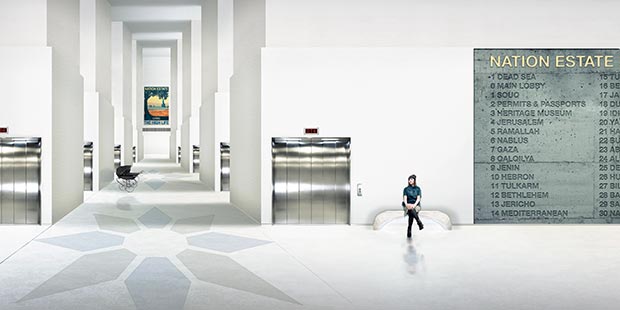 Larissa Sansour / Nation State - Main Lobby / Courtesy of Lawrie Shabibi and the Artist
Larissa Sansour / Nation State - Main Lobby / Courtesy of Lawrie Shabibi and the Artist
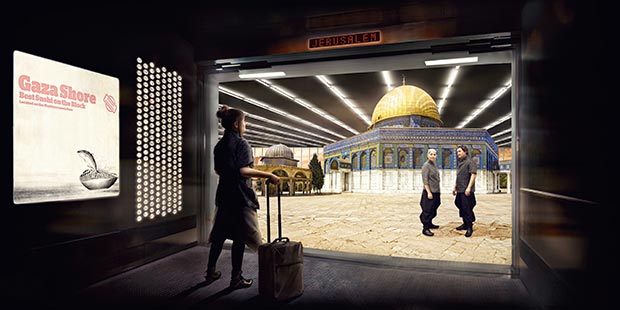 Larissa Sansour / Nation State - Jerusalem Floor / Courtesy of Lawrie Shabibi and the Artist
Larissa Sansour / Nation State - Jerusalem Floor / Courtesy of Lawrie Shabibi and the Artist
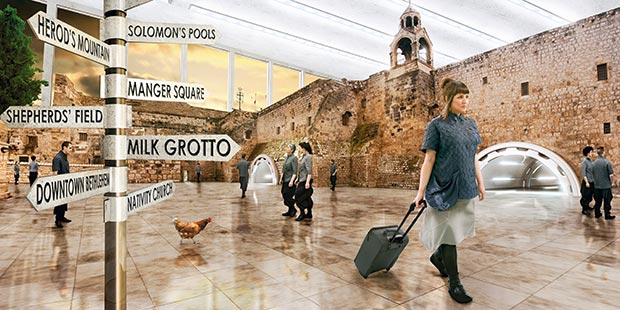 Larissa Sansour / Nation State - Manger Square / Courtesy of Lawrie Shabibi and the Artist
Larissa Sansour / Nation State - Manger Square / Courtesy of Lawrie Shabibi and the Artist
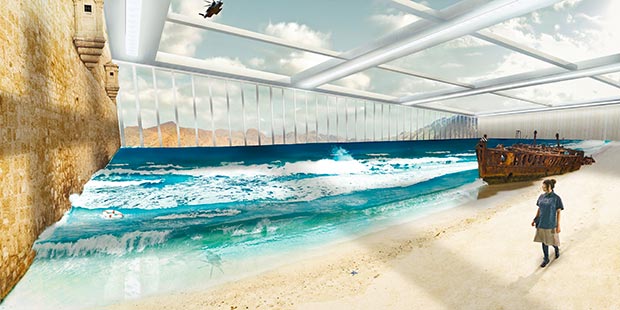 Larissa Sansour / Nation State - Meditereanean / Courtesy of Lawrie Shabibi and the Artist
Larissa Sansour / Nation State - Meditereanean / Courtesy of Lawrie Shabibi and the Artist
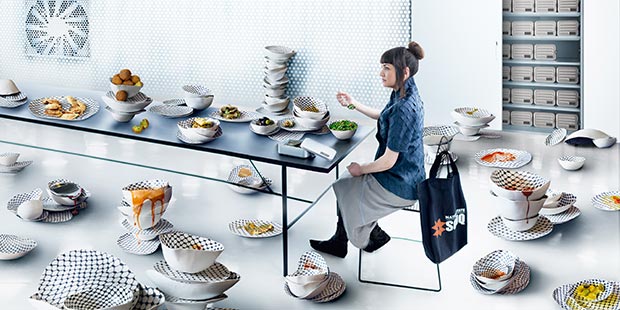 Larissa Sansour / Nation State - Food / Courtesy of Lawrie Shabibi and the Artist
Larissa Sansour / Nation State - Food / Courtesy of Lawrie Shabibi and the Artist
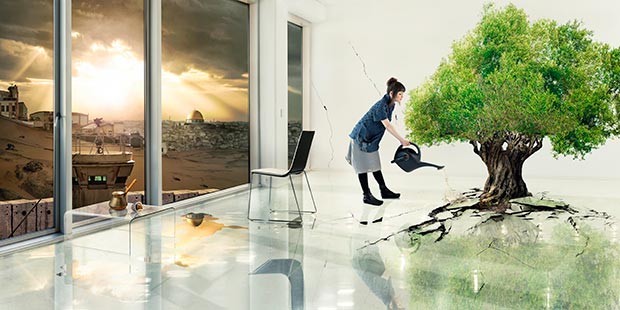 Larissa Sansour / Nation State - Olive Tree / Courtesy of Lawrie Shabibi and the Artist
Larissa Sansour / Nation State - Olive Tree / Courtesy of Lawrie Shabibi and the Artist
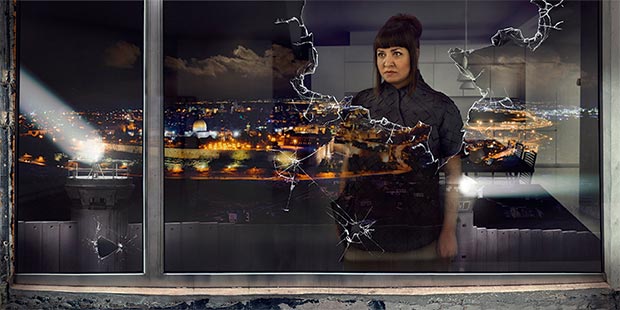 Larissa Sansour / Nation State - Window / Courtesy of Lawrie Shabibi and the Artist
Larissa Sansour / Nation State - Window / Courtesy of Lawrie Shabibi and the Artist
I think the new generation of Palestinian artists are very inspiring in that many are trying to find very innovative ways of addressing an age long problem. I think artists can only address and talk about the context they appear in and it is clear that it is impossible to avoid the political problem they find themselves in on a daily basis.
Due to the repetitive nature of the situation, the world has long since become immune to footage and stories from Palestine. I think humour brings forth a humanness that rational documentation are unable to achieve. It is also able to reengage the interest of audiences worldwide and look at the conflict with fresh eyes and a new perspective.
I think that it is very important for an artist to have the backing of a gallery. Artists as well as anyone else should be able to make a living of their art in order to maintain a good work flow. I don’t believe in the romantic idea of the starving artist, it is a very outdated idea and not a very practical one. I think artists have to work hard to change this cliché of the altruistic artist, because it is nothing more than a destructive sentiment.
I am looking very much forward to my show at Lawrie Shabibi in Dubai, because it is the first time that I ever show 'Nation Estate' as whole with the film and the photographs in the Arab World.
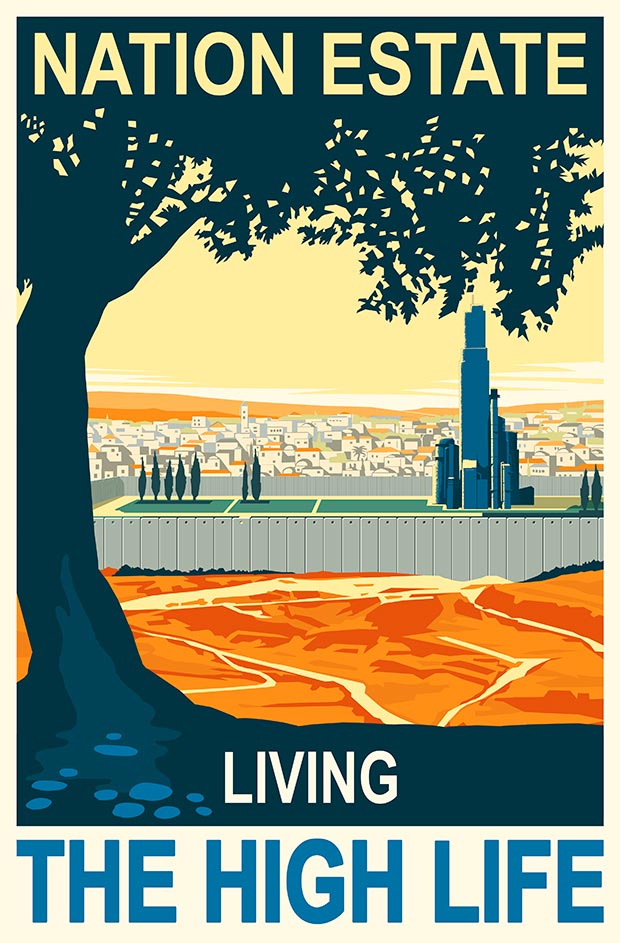 Larissa Sansour / Nation State Poster / Courtesy of Lawrie Shabibi and the Artist
Larissa Sansour / Nation State Poster / Courtesy of Lawrie Shabibi and the Artist
My next work tackles the archeological war that is going on in the Middle East at the moment. Israel is engaging more and more in excavations to prove the presence of the Jewish people thousands of years ago. In my project, I want to create material for a future archaeology, and act of determinism in itself but also an optimistic hope for a time when future archaeologist will finally excavate remains of a Palestinian cultural DNA and finally realize that they do or did exist.
Tonight all our members in UAE have a chance to visit the solo exhibition 'Science Faction' by Larisa Sansour at Lawrie Shabibi in Dubai. Don't miss this unique opportunity to see the amazing 9-min film 'Nation State' and the set of seven photographic works. Alongside 'Nation Estate', Science Faction will also feature works from 'A Space Exodus', an earlier series by Sansour leading the way for the 'Nation Estate' project. For more information visit Lawrie Shabibi website.
Comments
Add a comment